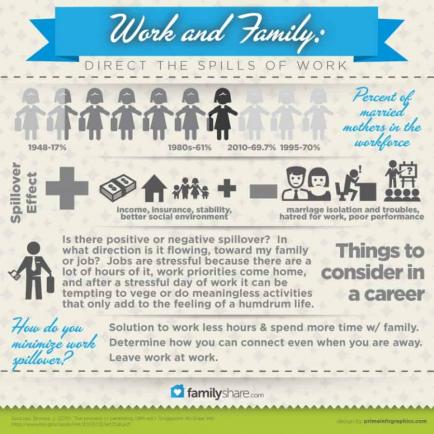
A report issued by the Bureau of Labor Statistics illuminates how families have changed in regard to the workforce. The report explains that in 1948 only 17 percent of married mothers participated in the workforce. In the 1980s, the number had tripled to 61 percent and by 1995, 70 percent. More recently, in 2010, the growth of the number of married mothers has leveled off at 69.7 percent.
In the information age and an age with increasing economic pressures many women are choosing to work. Some women have to work and many want to work. This newer generation of dual-income homes and working mothers adds new and complex aspects to family life. No matter what the reason is for working, it is perhaps in all of us to consider what is best for the family, especially when children are involved.
Work is a blessing and a curse when it comes to family life (hopefully, mostly a blessing); something that family scientists call "spillover effect". Spillover effect can happen both positively and negatively and both directions to family and work, and even a better social environment for children to be raised in. In the opposite direction, children and spouses can motivate us to work harder and enjoy what we do. The negative aspects, of course, are less heartwarming and, indeed, we should consider them more thoughtfully because we don't want to be miserable at work and at home. When our marriage is going through a rough patch or our kids are making poor decisions this may "spillover"� into our work performance and personal behavior. The results can be grievous; we may find ourselves hating work or receiving poor performance reviews because of our bad attitude or behavior at work. Again, in the other direction, When deadlines at work pressure us like coal to diamond, I'm not sure we always come out diamond. Sometimes we just come out like a lump of, well"�coal. The overall effect ends up being that our family experiences our work frustrations and our resentment of our job or lot in life. The worst scenario, the marriage feels isolated and kids wonder why mom or dad look like crazed wild beasts all the time.
Whether you are already in a career or are considering your options, consider how your affecting your job and how is it affecting you. Is there positive or negative spillover? In what direction is it flowing, toward my family or job? Jobs are stressful because there are a lot of hours of it, work priorities come home, and after a stressful day of work it can be tempting to vege or do meaningless activities that only add to the feeling of a humdrum life.
To counteract spillover from work, try working on these three areas. If you are working overtime, look for a probable solution to work less hours and spend more time with family. If this is not possible, determine how you can connect with family even when you are away. Many parents resent it, but parents who text will feel a closer connection and know more about what is going on in their children's life (a phone call works too).
Leave work at work. When at home, spend meaningful time with a spouse and or children to connect. Meaningful activities in will alleviate stress, develop emotional bonds within the family, and help with the third and last concern: Do not do meaningless activities, plan. It may be fun to spend a hours watching YouTube, but it won't create lasting memories or emotional bonds between your spouse or children. I never left a Youtube session saying, "Wow, the value of my life just caught fire"�. Most of all, be grateful. Your family is experiencing many of the stresses that you feel, even if it is only indirectly.
Source:
Brooks, J. (2011). The process of parenting. (8th ed.). Singapore: McGraw Hill.

